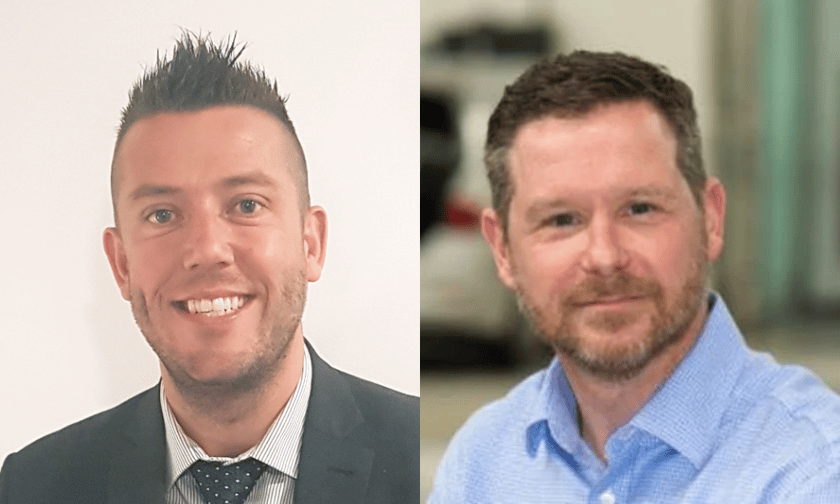

During a recent interview with Insurance Business, leaders from Allianz Commerical and LV= highlighted the changing attitudes towards sustainability in motor repair networks as sustainability targets and ESG obligations increasingly start to make their presence known.
Yet the move towards businesses becoming increasingly environmentally conscious is far more of a ‘carrot’ than a ‘stick’ enterprise, according to Michael Golding (pictured right), motor network manager for LV=. He highlighted the slew of commercial benefits that can stem from selecting eco-friendly repair options, whether that’s in the form of potential premium discounts, excess reductions or – in the case of green parts –improved repair timings, given the delays still being seen across various segments of the supply chain.
Nick Kelsall (pictured left), head of claims for Allianz Commercial, agreed with Golding’s attestation that sustainability represents a “win for customers, ourselves and the repairer”. It offers a range of both ‘soft’ and ‘hard’ benefits to the market, he said, allowing businesses to make the right choices, and to do so backed by commercial considerations.
“That’s not to say the environment is a ‘soft’ benefit, because it’s one of the most important things on our agenda as a business and as a society right now,” he said. “But you have got ESG and sustainability standards that represent a nice chance to do what’s right for policyholders and right for your business. Then you have the hard, measurable benefit of what a green part actually does in terms of reducing your key-to-key time.
“The reality is that vehicle manufacturers don’t actually make a lot of money from selling cars, they make a lot of money from the data they obtain from those vehicles, but also its service and maintenance. They also make a lot of their income from selling insurers parts. That gives them an element of control, and while they’ve got demand, they can drive the supply and they can drive the price. And as they’re competing, they want to charge insurers for higher parts inflation than their customer.”
Using green parts shifts that balance of power, Kelsall said, because it enables companies to source these parts more quickly. This is being aided by the evolution of AI, which Allianz Commercial is using to help it source green parts more effectively to bring them into the supply chain more quickly which helps get customers back on the road faster.
“Green parts are good for the environment and they’re good for society, but also, inevitably, they will shorten repair lifecycles, which will drive down costs,” he said. “And since we’re in a hard, competitive market, Allianz can pass those cost savings on to customers.”
Golding noted that sustainability remains in its infancy in the actual repair sector and, with that in mind, underscored the role that collaboration and greater education of the wider market has to play in moving the dial on green solutions. For the team at LV= that means making sure its entire supply chain is fully engaged with its ESG strategy, he said, and ensuring that the business makes its expectations from its partners as clear as possible.
“We need to set out our clear intentions for where we’re going as a market so that they’re able to work with us, as we head towards important milestones such as our commitment to being net-zero with internal greenhouse emissions from business operations by 2030,” he said. “We need to be clear about our expectations but it’s also important for us to know what their challenges are.
“Off the back of COVID, there’s a number of industry challenges facing our partners but we’ve still got to meet these targets and we’ve still got to make progression towards these goals, regardless of some of these challenges, particularly around inflation. So, I think it’s about getting to the point where you’re working with the right partners who share your philosophy and can follow you on that journey.”
Collaboration is instrumental to moving the dial on sustainability in the motor repair industry, Kelsall said, and, from his perspective, the key to success hinges on joining up the ‘carrot’ and the ‘stick’ approaches as neither is fully effective in isolation. Whether it’s looking at ways to sustainably repair EV batteries or discovering more sustainable mobility solutions more generally, finding innovative solutions requires actively working with partners across the value chain.
“Looking at the property space, when you have a burned-out property, we as an insurer, give you the money to rebuild that, but let’s rebuild it sustainably,” he said. “The contractual obligation is to put you back in the financial position you would have been in if the incident hadn’t occurred.
“But let’s be brave and more futuristic than that. Let’s actually put you in a better position, that’s more sustainable and has a more positive impact on the environment. I think that’s how we, as an industry, can start to build trust.”
